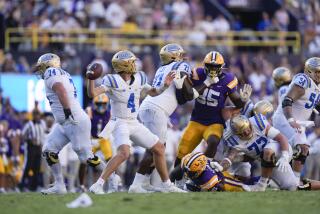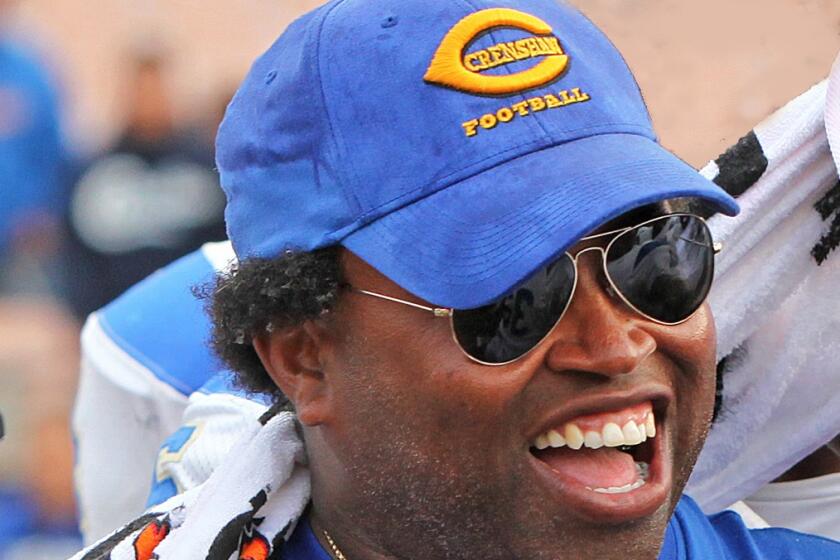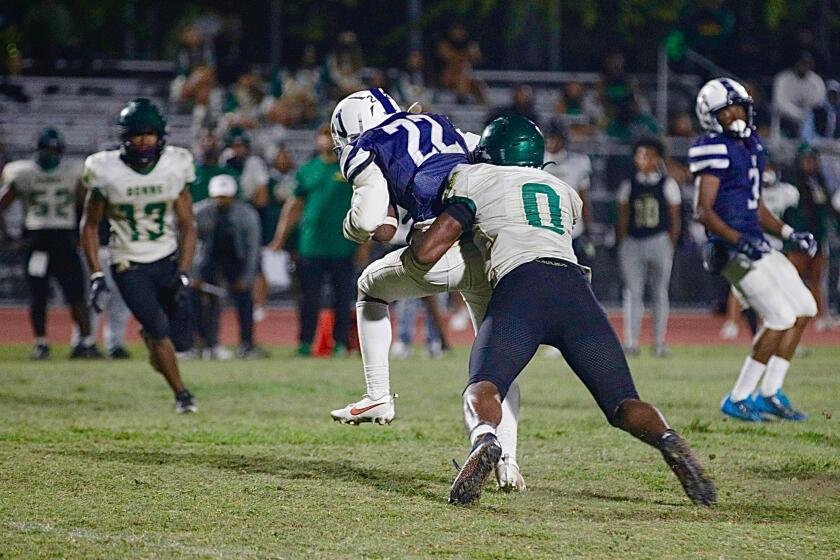Analysis : Fullertonâs Big Chance : Titans Will Play LSU in Football Next Season in a Schedule Move That Could Easily Make More Dollars Than Sense
Thereâs a typo in the Cal State Fullerton football media guide. It has to be a typo. Itâs beneath the heading of âFuture Schedules,â under the year 1987. It says: Sept. 12 at LSU.
Surely, thatâs supposed to read âWSU,â for Washington State University. Or âISU,â as in Idaho State University. An âLâ instead of an âI.â It could happen to anyone.
But Cal State Fullerton Athletic Director Ed Carroll assures us that thereâs no mistake about it. The Titans will play their second game of the 1987 season in Baton Rouge, La., against the Tigers of Louisiana State University.
Thatâs LSU as in 7-2 going into Saturdayâs game against Notre Dame. As in current leaders of the Southeastern Conference, ahead of Alabama, Georgia, Auburn and Mississippi, to name plenty.
The Tigers are a part of big-time college football and represent an opponent the likes of which Fullerton has never before encountered. This following a season that came within a two-point conversion--in the final minute of the final game--of being the worst in the Titansâ 17-year football history.
The nice part about enduring a season like the one the Titans finished last Saturday is that you earn the right to say, âWait âtill next year.â So what are they saying around the Titan Football House these days? âWait âtill next year, when we open with five straight road games, including one at LSUâ?
Thereâs more. Fullerton is scheduled to open its 1988 season at West Virginia, and its 1989 schedule will include an October game at the University of Florida. Itâs all part of a commitment by Cal State Fullertonâs athletic officials to upgrade the Titansâ schedule and move them one step closer to the big time. But one has to wonder whether that commitment will only get the Titans in over their heads. At LSU ?
The 1987 schedule is reason enough for Fullerton Coach Gene Murphy to hope that he can someday look back at 1986 and call it a ârebuildingâ year. Carroll compared the recent season to Fullertonâs 1982 campaign. The Titans went 3-9 that year, too. The next season, they won the Pacific Coast Athletic Assn. and played in the California Bowl. In 1984, they finished with an 11-1 record that was among the best in the nation. So, Carroll says, whoâs to say the Titans wonât have a similar turnaround next year?
But 1986 wasnât supposed to be a rebuilding year. A preseason media poll had the Titans finishing second in the PCAA behind Fresno State. Of course, the same poll had eventual conference champion San Jose State finishing sixth, which tells you how much sportswriters and sportscasters know. But even Murphy quietly felt that if a few young players at key positions could fulfill their potential, the Titans could contend for the conference title.
So why didnât they? The reasons are many, but the biggest are these:
--Nine road games, more than any Division I-A team in the country. The Titans were originally scheduled to play five games at home and seven on the road, a much more reasonable mix. But a home game against Northern Arizona became a road game at Tulsa when ESPN offered the Titans a chance at playing on national television. And, in the ultimate example of what Fullerton will do if the price is right, the Titansâ homecoming game against Fresno State was moved to Fresno so that it could be included in ESPNâs package of Thursday night telecasts. That decision was made in August, shortly before the Titans were due to open their season.
The Titans were 2-1 in Santa Ana Stadium, their home away from home, and 1-8 on the road. The only road victory came in last Saturdayâs season finale at Pacific.
Carroll defended the schedule, saying that it was more a matter of who the Titans played than where. âI think we could have played nine games at home and three on the road, and our record might have been the same,â he said. âIt was something we needed to do this year because of the unique opportunities (we had). Originally, we were going to play five home games, but the Tulsa and Fresno games were nationally televised, and there were a lot of advantages in that. In fact, I think one of the high points of the season is the exposure we got this year.
âIt would have been nice to have gone 12-0 with all that exposure, but since we didnât itâs still better to have people see our product and hear about us. I think we really did a good job of getting Titan football exposed this year.â
Murphy understands the reasoning but hopes he doesnât ever have to spend that much time in airports and hotel rooms in one season again. âWeâve done it before,â he said. âIn â84, we played eight on the road. But we played them with some of the best football players weâve ever had here. But no, itâs not easy to play nine games on the dang road. We have five games at home next year. Thatâs the most I remember having since Iâve been here. But this is November . . . that could change.â
--Inexperience and lack of depth. Injuries forced Murphy to rush young players into the lineup before their time and play some out of position. Offensive guard Mark Stephenson and linebacker Bryan Riggs--players Murphy considered pro prospects--suffered season-ending knee injuries within minutes of each other in the Titansâ victory over Idaho State in the third week of the season. Murphy began losing the numbers game before the Titans took the field for their first game. In August, Murphy saw nine of his freshman recruits declared academically ineligible for failing to meet the new standards set by the NCAAâs Proposition 48.
Part of Fullertonâs recent success has come through recruiting talented athletes who were considered academic risks by more prestigious schools. The NCAA rule, which went into effect this season, has forced Murphy and his staff to reevaluate their approach to recruiting. Murphy estimates that he will recruit nine junior college players this winter, an unprecedented number for a program that has relied almost exclusively on high school players for its talent pool.
âWe have to for two reasons,â said Jim McAllister, the Titansâ recruiting coordinator and running back coach. âNot only for Prop. 48, but for the schedule next year. How the hell are we going to start slow? Weâve got five games on the road, including LSU. Weâd better get some guys who are ready to play.â
Carroll, a firm believer that the glass is half-full even when itâs empty, sees the LSU game as a no-lose proposition. âWe wonât be expected to win,â he said. âWe wonât be favored to win. If we lose, a lot of people will say, âWell, thatâs to be expected.â If we win or we play them competitively, it will give us the recognition that I think we deserve, and give our kids a lot of confidence.
âIt helps our recruiting to play that kind of schedule. It helps with future scheduling because it will get the word out that weâre a legitimate (Division) I-A program and weâre playing those types of people.â
The mere thought of the LSU game adds a few more distinguished gray hairs to Murphyâs scalp. âPlaying at LSU with the â84 team would scare me,â he said.
Scary or not, the LSU game offers the Titans financial guarantees they are in no position to refuse. It may make more dollars than sense, but Fullerton will pack its bags and head to Baton Rouge next fall.
âItâs a money game,â Murphy said. âYou have to play those types of games. We just have to hope we can get out of there physically and mentally intact. But, in order for the whole athletic program to subsist, we have to go out and play a game where weâre gonna get a couple hundred thousand bucks.â
More to Read
Go beyond the scoreboard
Get the latest on L.A.'s teams in the daily Sports Report newsletter.
You may occasionally receive promotional content from the Los Angeles Times.










